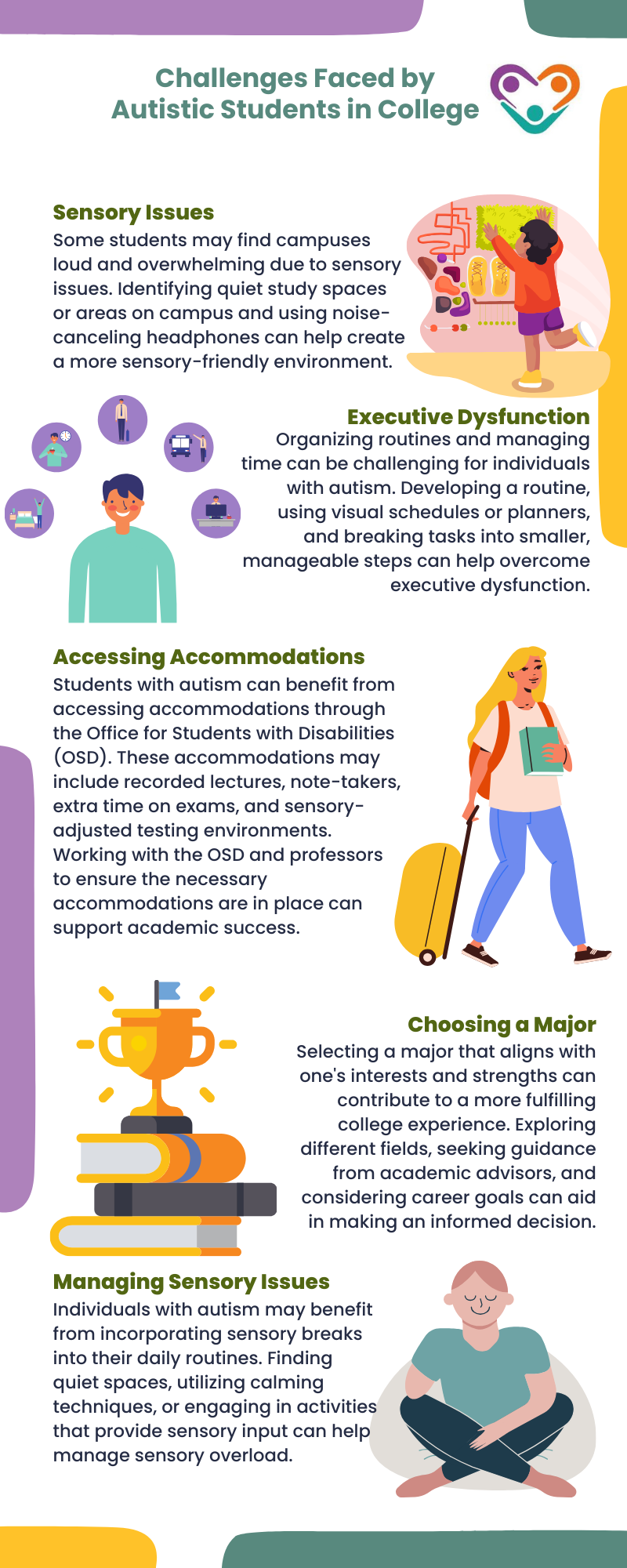As individuals with autism transition into college, careful preparation and planning are essential to ensure a smooth and successful experience. However, there are certain challenges that they’ll have to go through at the same time. That’s what we’re going to cover in this article.

Challenges in College for Autistic Students
Transitioning to college can present unique challenges for autistic students. While college offers new opportunities for growth and learning, it can also bring about difficulties related to executive function and independent living.
Executive Function Difficulties
Autistic students may face challenges with executive function in college. Executive function refers to a set of cognitive abilities that help individuals plan, organize, and manage their time effectively.
Disrupted executive function can make tasks such as living in a dorm, scheduling homework, and maintaining proper nutrition overwhelming for autistic students. Luckily, there are ways to circumvent that. Let’s look at some useful strategies below:
- Difficulty with time management and prioritization – Use visual schedules and planners to break tasks into smaller, manageable steps. Set reminders and alarms to stay on track. Seek assistance from academic advisors or support services.
- Trouble with organization and maintaining routines – Establish a consistent daily routine. Utilize organizational tools such as labels, color-coding, and storage systems. Seek support from counselors or mentors who can provide guidance on organization techniques.
- Difficulty with self-regulation and impulse control – Practice self-awareness and mindfulness techniques. Utilize strategies like deep breathing and taking breaks when feeling overwhelmed. Seek counseling or therapy services for additional support.
Independent Living Challenges
For many autistic students, college is their first experience of living independently without the usual support and services they may have had during their school years. Independent living presents its own set of challenges that can be overwhelming for autistic students.
Here are the common challenges they often face and how to work around them:
- Managing daily tasks and responsibilities – Create a daily checklist or schedule to stay organized. Break tasks into smaller, manageable steps. Seek assistance from roommates, friends, or support services when needed.
- Adapting to new social environments and making friends – Join clubs or organizations that align with personal interests. Attend social events and engage in conversations with peers. Seek support from on-campus counseling services or support groups.
- Dealing with sensory issues in a new environment – Identify sensory triggers and develop coping strategies. Utilize noise-cancelling headphones or fidget toys to manage sensory overload. Advocate for accommodations with the college’s disability services office.
- Establishing a healthy work-life balance – Prioritize self-care and set boundaries. Schedule regular breaks and leisure activities. Seek support from counselors or mentors who can provide guidance on maintaining a healthy balance.
By recognizing and understanding the challenges that autistic students may face in college, it becomes possible to develop effective strategies and provide the necessary support to help them navigate these obstacles. With the right tools and resources, autistic students can thrive academically and personally during their college years regardless of their learning styles.

Tools and Strategies for Success
Navigating college with autism by having the right tools and strategies in place can greatly contribute to a successful and fulfilling experience.
There are two key aspects to achieve this which are as follows:
The Use of Organizational Tools
Autistic students may benefit from utilizing various organizational tools to help them stay on track and manage their responsibilities effectively. These tools can provide structure, visual cues, and reminders to support their daily routines and academic tasks.
Some commonly used organizational tools for autistic students include:
- Visual Schedules – Visual schedules use pictures, symbols, or written words to outline daily activities and tasks. They provide a clear visual representation of what needs to be done, helping students with autism understand and follow their routines.
- Planners and Calendars – Planners and calendars are invaluable tools for keeping track of assignments, due dates, and important events. Autistic students can use these tools to plan their study schedules, set reminders, and stay organized throughout the semester.
- Alarm Clocks and Timers – Alarm clocks and timers can be used to create structured time blocks for studying, breaks, and other activities. Setting specific time limits can help students stay focused and manage their time effectively.
By incorporating these organizational tools into their college routine, autistic students can enhance their ability to manage their time, prioritize tasks, and stay organized.
Planning Ahead for Success
Planning ahead is crucial for individuals with autism who are transitioning to college. By preparing in advance, students can identify potential challenges and develop strategies to overcome them.
Here are some key areas where planning ahead can contribute to success:
- Accessing Accommodations – Autistic students attending college can benefit from accessing accommodations through the Office for Students with Disabilities (OSD) or a similar department. These accommodations may include recorded lectures, note-takers, extra time on exams, sensory-adjusted testing environments, and other resources tailored to individual needs. It is important for students to connect with the appropriate resources and discuss their specific requirements.
- Establishing Support Networks – Building a support network is essential. This can include reaching out to campus support services, joining student clubs or organizations related to autism advocacy, and connecting with other students who have similar experiences. These networks can provide invaluable support, understanding, and guidance throughout the college journey.
- Developing Coping Strategies – College life can be overwhelming, especially for students with autism. Developing coping strategies, such as practicing self-care techniques, seeking counseling services, or engaging in stress-reducing activities, can help students manage the demands of college and maintain their well-being.
Incorporating organizational tools and planning strategies can significantly contribute to the success and well-being of autistic students in college. By utilizing these tools and strategies, students can navigate the demands of college life with greater ease and make the most of their educational journey.

Common Challenges at College and How to Address Them
Autistic students who are attending college may encounter various challenges related to studying effectively, accessing appropriate accommodations, living independently, dealing with sensory processing issues, and organizing routines to maintain productivity.
It’s essential to address these challenges and find strategies that work for each individual.
Here are some common challenges faced by autistic students in college and strategies to address them:

By addressing these common challenges and utilizing strategies that work best for each individual, autistic students can set themselves up for a successful college experience.
It’s important to remember that everyone’s college journey is unique, and with the right support and resources, individuals with autism can thrive academically and personally.
If you’re seeking specialized ABA therapy in New Jersey, Indiana, Georgia, and New York, Golden Care offers comprehensive services tailored to meet the unique needs of each individual. Contact us to learn more or book a consultation today.
Sources:
https://childmind.org/article/going-to-college-with-autism
https://www.autismparentingmagazine.com/autism-preparation-college
https://homework.study.com/resources/student-autism-spectrum-study-tips.html
https://sparkforautism.org/discover_article/autism-and-the-college-experience



